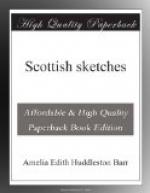“I do not see that at all.”
“Do you mind last summer, when we were up in Argyleshire, how your cousin, Roy Callendar, walked, with ne’er the wink o’ an eyelash, on a mantel-shelf hanging over a three-hundred-feet precipice? Roy had the trained eyesight and the steady nerve which made it lawfu’ for him; for you or me it had been suicide—naething less sinfu’. Three or four glasses o’ whiskey are safer for some men than twa for you. I hae been feeling it my duty to tell you this for some time. Never look sae glum, Davie, or I’ll be thinking it is my siller and no mysel’ you were caring for the night when ye thought o’ my cloak and umbrella.”
The young man rose in a perfect blaze of passion.
“Sit down, sit down,” said his uncle. “One would think you were your grandfather, Evan Callendar, and that some English red-coat had trod on your tartan. Hout! What’s the use o’ a temper like that to folk wha hae taken to the spindle instead o’ the claymore?”
“I am a Callendar for all that.”
“Sae am I, sae am I, and vera proud o’ it fore-bye. We are a’ kin, Davie; blood is thicker than water, and we wont quarrel.”
David put down his unfinished glass of toddy. He could not trust himself to discuss the matter any farther, but as he left the room he paused, with the open door in his hand, and said,
“If you are afraid I am going to be a drunkard, why did you not care for the fear before it became a question of L2,000? And if I ever do become one, remember this, Uncle John—you mixed my first glass for me!”
CHAPTER II.
A positive blow could hardly have stunned John Callendar as this accusation did. He could not have answered it, even if he had had an opportunity, and the shock was the greater that it brought with it a sudden sense of responsibility, yea, even guilt. At first the feeling was one of anger at this sudden charge of conscience. He began to excuse himself; he was not to blame if other people could not do but they must o’erdo; then to assure himself that, being God’s child, there could be no condemnation in the matter to him. But his heart was too tender and honest to find rest in such apologies, and close upon his anger at the lad crowded a host of loving memories that would not be put away.
David’s father had been very dear to him. He recalled his younger brother in a score of tender situations: the schoolhouse in which they had studied cheek to cheek over one book; the little stream in which they had paddled and fished on holidays, the fir-wood, the misty corries, and the heathery mountains of Argyle; above all, he remembered the last time that he had ever seen the bright young face marching at the head of his company down Buchanan street on his way to India. David’s mother was a still tenderer memory, and John Callendar’s eyes grew misty as his heart forced him to recall that dark, wintry afternoon when she had brought David to him, and he had solemnly promised to be a father to the lad. It was the last promise between them; three weeks afterwards he stood at her grave’s side. Time is said to dim such memories as these. It never does. After many years some sudden event recalls the great crises of any life with all the vividness of their first occurrence.




